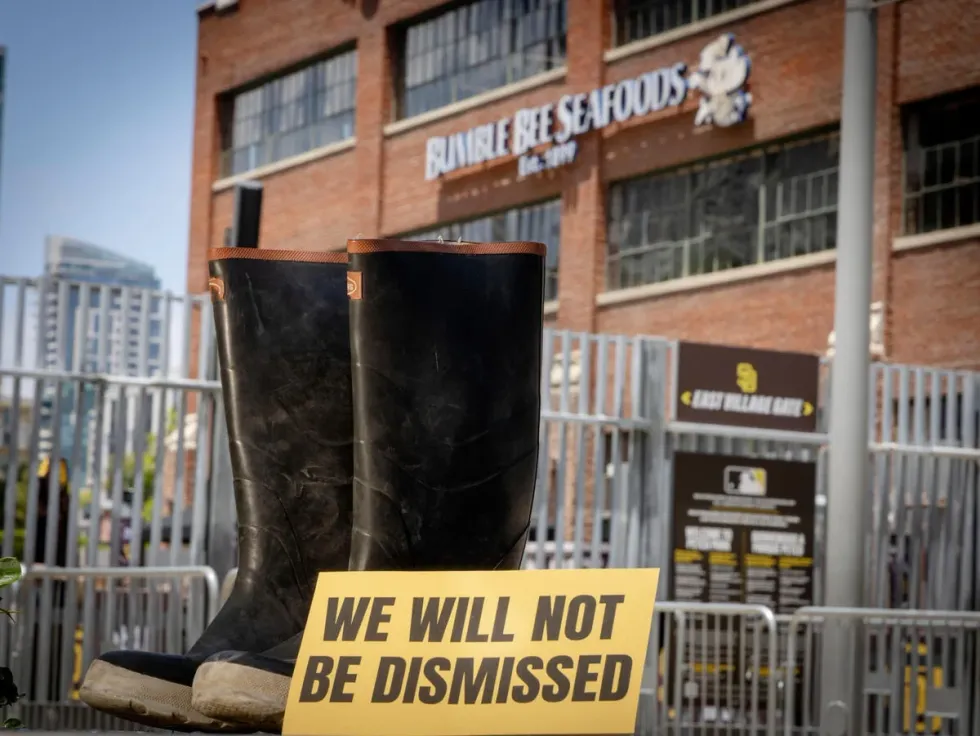
On July 31, Indonesian fishers who sued Bumble Bee, alleging years of forced labor while catching fish sold by the U.S. tuna brand, responded to the company’s motion to dismiss their suit, arguing that they have a right to have their allegations heard in court.
The reply contends that, the plaintiffs plausibly allege, and Bumble Bee does not dispute, that the plaintiffs were forced to labor by the vessel owners and argues the company was long specifically aware of such abuses in its supply chain, asserting this meets the Trafficking Victims Protection Reauthorization Act (TVPRA) standard. The reply also defends the plaintiffs’ negligence claims, stating Bumble Bee’s actions created both risk of forced labor and incentive for the vessel owners to abuse the plaintiffs.
The fishers filed suit against Bumble Bee in March under the TVPRA, one of the first times the seafood industry has been challenged under this Act in a U.S. court. The four fishers allege conditions of forced labor: that they were held in debt bondage, denied fair wages, isolated at sea for months, and subjected to both physical and psychological abuse while catching tuna that was sold by Bumble Bee in the U.S.
Sari Heidenreich, senior human rights advisor at Greenpeace USA, said: “The plaintiffs’ reply is clear — their case meets the high standards required by U.S. law and should be heard by the court. I am confident they will prevail.”
According to the reply, Bumble Bee sources 95% to 100% of its albacore through its Taiwanese parent company, Fong Chun Formosa (FCF), and a ‘trusted network’ of vessels. The reply argues that many of the vessels in that network, including those “the plaintiffs were forced to work” on, fish exclusively for Bumble Bee. The plaintiffs argue their experiences reflect a broader pattern, partially enabled by Bumble Bee’s continued use of transshipment — a practice widely criticized by experts and increasingly abandoned by other major seafood companies due to its links to forced labor.
Heidenreich continued: “Rather than act to ensure that workers in their supply chain are protected from forced labor and abuse, Bumble Bee has attempted to sweep them aside through a procedural motion. This move is more than just a legal strategy; it is an attempt to avoid accountability, silence vulnerable workers, and protect corporate interests over human dignity. Without attempting to remedy any harms that occurred on these vessels and improving that workplace for current and future workers, this is akin to the practice of ‘cut and run’, which experts agree is irresponsible and leaves workers in an even more vulnerable situation.
“In response to consumer demand, Bumble Bee has allowed customers to trace each can of tuna they buy back to the boat that caught it. But in its Motion to Dismiss, it attempted to distance itself from these same suppliers. Bumble Bee cannot have it both ways. The TVPRA and trade law make clear that corporate responsibility doesn’t stop at the U.S. border. Companies that cannot take responsibility for the products they sell have no business profiting from them.
“A just and sustainable seafood industry must prioritize the well-being of all its stakeholders — from the migrant fishers working under dangerous conditions to the American consumers who have made it clear: they do not want seafood tainted by modern slavery or environmental destruction.”
A letter expressing solidarity with these individuals was released today by 45 organizations from eight countries. The signers, which include the International Transport Workers’ Federation (ITF), the Retail, Wholesale and Department Store Union (RWDSU), Friends of the Earth, and Freedom United, condemn human trafficking, while expressing support for the right of all individuals to seek justice and demand accountability. They also highlight the essential and inseparable relationship between healthy oceans and decent work.
Greenpeace USA continues to call for decisive action from every actor in the seafood supply chain to help end isolation at sea. This includes mandating:
- Free, accessible, and secure wifi on all fishing vessels to allow fishers to have contact with their families, unions, and governments;
- Capping time at sea at three months to reduce the risk of human rights abuse, forced labor, and human trafficking; and
- 100% human or electronic observer coverage to ensure vital data on catch composition, bycatch, interactions with protected species, and overall fishing practices are reported by independent and impartial parties.
In addition, unionization and the right of association are essential to empowering workers across all parts of the seafood supply chain. Accessible, secure, and responsive grievance mechanisms — available both on land and at sea — must become a standard in the industrial fishing industry. These tools are critical not just for addressing abuses when they occur but also for preventing them in the first place.
At least 128,000 fishers worldwide are victims of forced labor, which is strongly connected to other fisheries-related crimes, such as illegal, unreported, and unregulated (IUU) fishing. These activities significantly contribute to the worsening of the ocean and climate crises.
This content originally appeared on Common Dreams and was authored by Newswire Editor.
